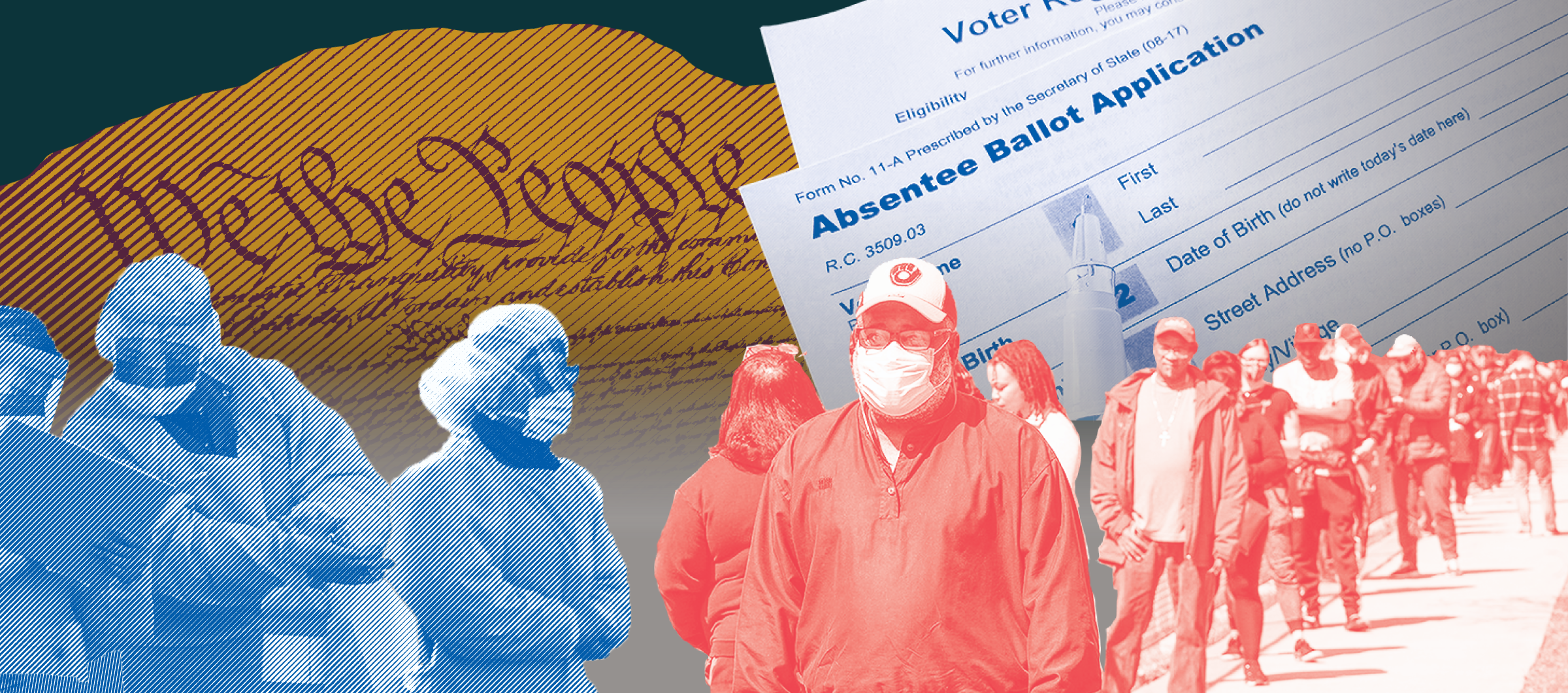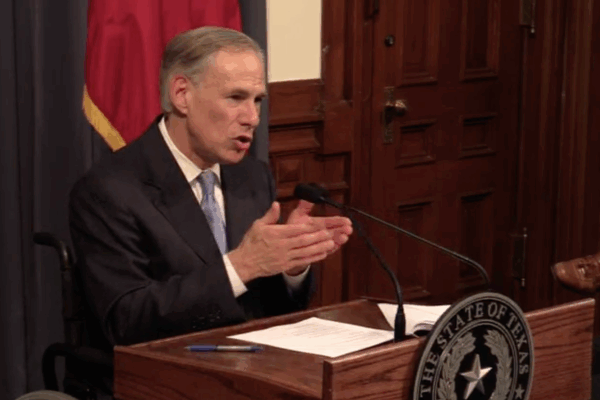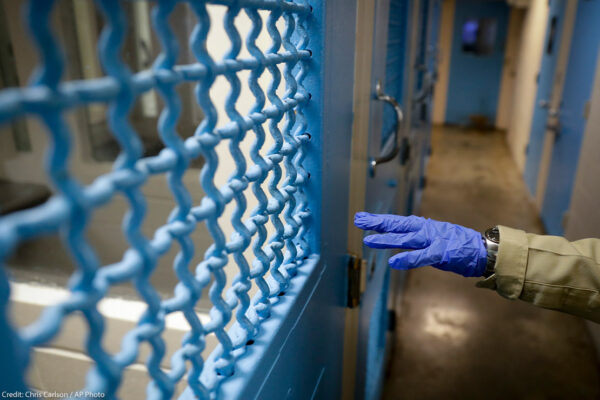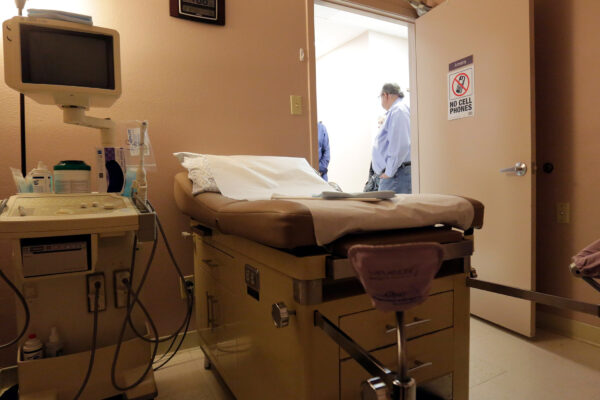

COVID-19 and Civil Liberties
Last updated on April 07, 2020
COVID-19 and Civil Liberties
Last updated: April 2020
Even in a public health emergency, governments still have the duty to protect our rights. Yet since the start of the COVID-19 outbreak, we have witnessed countless attempts by state and local agencies to infringe upon Texans’ civil liberties.
Since the onset of the pandemic, the ACLU of Texas has been monitoring government responses to the health crisis closely, and we have acted quickly to protect civil rights and civil liberties while also upholding evidence-based guidance from public health experts. Specifically, we have aggressively acted on behalf of people whose rights and health are at heightened risk, including protections for voters, people in the criminal legal system, and those seeking access to critical abortion care.
Read more about the actions we are taking during this unprecedented time:
Challenging police brutality at protests
- Ahead of Juneteenth protests, we demanded that the largest law enforcement agencies in Texas publicly commit to ending the use of force and violence against protesters and to end mass arrests of peaceful protesters. The letter to local law enforcement agencies details ten principles to protect protesters' health and constitutional rights.
- We wrote to mayors, city council members, police chiefs, district attorneys, county judges, and county commissioners calling them to take immediate action to safeguard the health and safety of protesters and protect their constitutional rights to free expression and assembly.
Reducing mass incarceration in Texas jails and prisons
- Victory: On April 10, a state judge granted a Temporary Restraining Order blocking enforcement of Governor Abbott's unconstitutional executive order that limited who may be released from jails during pandemic emergency.
- On April 9, we filed a lawsuit, along with our partners, representing nine individuals in the Dallas County Jail, against Dallas County and Sheriff Marian Brown. We are asking for the immediate release of anyone over 50 and those who are most vulnerable to contracting the novel coronavirus that causes COVID-19.
- Take Action: As the COVID-19 pandemic continues to spread across Texas and the nation, Governor Abbott must take immediate action to prevent a potential outbreak in Texas prisons and jails, where close quarters make social distancing impossible. While we take this fight to the courts, send Governor Abbott a message and urge him to follow the advice of public health officials to keep all Texans safe.
- Read our response to Governor Abbott's unconstitutional executive order, issued on Sunday, March 29, that suspends the rights that individuals, who are presumed innocent, have while facing criminal prosecution. That's why we sued.
- On March 19, the ACLU of Texas and a coalition of civil rights leaders sent almost 500 letters to criminal justice officials urging them to take public health experts’ advice and release individuals who are at high risk of severe illness or death from COVID-19 from county jails.
- People in government custody, including in prisons, jails, and civil detention, are often forgotten in emergencies. This creates unnecessary suffering and loss of life. Find out how prisons and jails can prepare for COVID-19.
Safeguarding access to the ballot box
- In a letter sent to Governor Abbott, Secretary of State Hughs, and all 254 County Clerks, we and partners asked that state and local elections officials take urgent steps to ensure safety and accessibility in the July and November elections.
- Update 6/15/20: The State of Texas filed a separate lawsuit in the Texas Supreme Court seeking a declaration that lack of immunity to COVID-19 on its own does not qualify an individual to vote by mail. The Court agreed, stating that “a voter can take into consideration aspects of his health and his health history that are physical conditions in deciding whether, under the circumstances, to apply to vote by mail because of disability.” After the Texas Supreme Court decision, we have moved to dismiss our lawsuit.
- Victory: On April 15, a Texas court ruled that all registered voters in Texas qualify for voting by mail due to the COVID-19 health crisis.
- On April 2, we and our partners joined a lawsuit seeking guidance from the court to declare that all registered voters, under Texas law, qualify to request a mail-in ballot as a result of the COVID-19 public health crisis.
- Read our letter of recommendations sent to Governor Greg Abbott, Lieutenant Governor Dan Patrick, Secretary of State Ruth Hughes and County Clerks urging an expansion of vote by mail during this election year.
- On March 20, Governor Abbott postponed the Texas primary runoff election date to Tuesday, July 14. We continue to monitor updates regarding Texas election cycle. Use this page as a one-stop shop for updates to the deadlines for voter registration, early voting, vote by mail, and other details for upcoming Texas elections.
- Members of the Senate and House Committees on Redistricting are still receiving testimony from the public on the once-a-decade process. Take Action: Find out when the committee is supposed to come to your area, and send them your testimony remotely.
- It is now even more critical that we make it as easy as possible for all eligible voters to vote by mail in 2020, and prepare for a likely surge in absentee ballots. Take action: Tell Texas officials to support the democratic process during a public health crisis.
Protecting immigrants and asylum
- On June 10, we and partners filed a legal challenge against the Trump administration’s decision to stop anyone from seeking asylum because of the pandemic. Besides violating U.S. immigration law, expulsions of asylum seekers also violate the nation’s international obligations to protect people fleeing persecution and torture.
- On April 21, we sent a letter to the Department of Homeland Security and Customs and Border Protection demanding that CBP, including Border Patrol, temporarily suspend civil immigration enforcement, cease any enforcement at sensitive locations, release everyone in CBP detention, and halt all border wall construction during the COVID-19 epidemic.
- Victory: On April 17, a U.S. District Court granted our request to release a person who is highly vulnerable to serious illness and death from novel coronavirus from MPC. This is the first decision in Texas granting someone's release because of the danger posed by COVID-19. Two other plaintiffs were released on bond after our lawsuit was filed.
- On April 8, we and our partners sued U.S. Immigration and Customs Enforcement and Department of Homeland Security (DHS) officials on behalf of four immigrants detained in Conroe, Texas at the Montgomery Processing Center (MPC).
- It has long been documented that DHS subjects people to inhumane conditions inside detention facilities. Now, these conditions are creating a ticking timebomb for a viral outbreak. We responded by filing an official complaint with the Office of the Inspector General, the internal watchdog agency overseeing Customs and Border Protection and U.S. Immigration and Customs Enforcement.
- Read the first-hand accounts of asylum seekers stuck in Northern Mexico, where the global coronavirus outbreak has added a new, frightening layer of risk into their lives.
Defending the right to have an abortion
- We’re representing the Houston Women's Clinic and joining an existing lawsuit by Planned Parenthood, the Center for Reproductive Rights, and The Lawyering Project that challenges Texas' efforts to block abortion access during this public health emergency.
- Abortion is legal in Texas. While Governor Abbott's executive order GA-09, enacted on March 22, 2020, caused an interruption in abortion services, that order expired on April 21 and a new executive order, GA-15, has gone into effect. Abortion providers can resume services under the process laid out by GA-15, and Texans can now access an abortion. Know your rights under the newest order.
Explaining stay-home orders: What you need to know
The COVID-19 pandemic has forced officials at every level of government to take urgent action to protect public health. However, the Constitution still applies, even during a public health crisis. Here's what you need to know:
- If you are stopped by police while outside of your home, stay calm and remember that you have rights. You have a right to remain silent and you also have a right to film the police.
- The Texas Disaster Act of 1975 gives the State of Texas and local governments authority to respond to emergencies, including pandemics. Once the governor and local governments declare a state of emergency, they may create emergency management plans that control the movement of people when it is “necessary for the preservation of life or other disaster mitigation.”
- The government's power is not unlimited — you still have constitutional rights under stay-home orders. As governments respond to this public health crisis, the measures they take to protect public health can still be examined in court.
- You are not required to have a letter from your employer if you work in an essential business. There is no show-me-your-papers rule requiring you to carry documentation or provide any proof about who you are or where you work.
The ACLU of Texas urges everyone to read and follow their local stay-home orders for the sake of their own health and the health of the entire community. Learn more about what your rights are, and how to protect them, during the COVID-19 pandemic.
Other resources
This page will continue to provide updates on how the COVID-19 pandemic is impacting Texans' civil rights and civil liberties. We will also be sharing relevant community and statewide news and resources here.
- We are living through unusual times. One thing we can be certain of is that our communities still need to heal and rebuild outside of COVID-19. Check out some easy ways to protect civil liberties during a pandemic.
- If you think you may have symptoms of COVID-19 or have questions about being tested, contact your general healthcare provider to ask about testing. If you do not have a general healthcare provider, contact the Texas Department of State Health Services.
- Visit the World Health Organization and Centers for Disease Control and Prevention for updates from public health experts on the global pandemic.
Related Content

- Voting Rights and Democracy|
- +3 Issues



